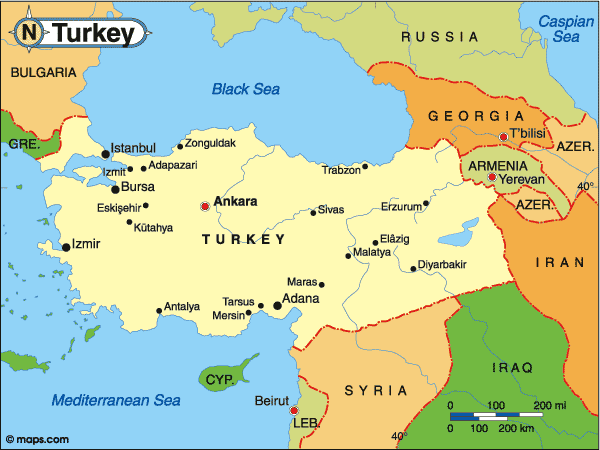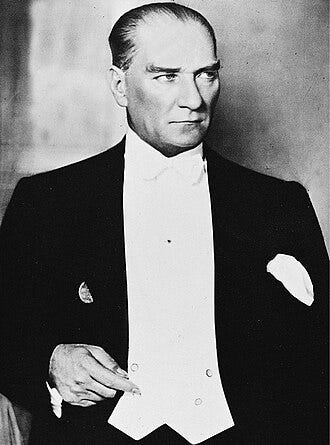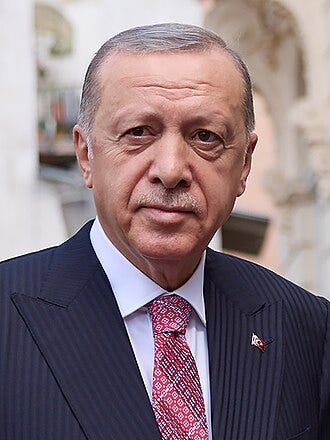Last week I posted my 2024-25 season preview for the Detroit Red Wings. Click the link below if you would like to read it.
Today I’m going to begin a look at a NATO “ally” that doesn’t seem to be acting like one, that country is Turkey. They seem to want to play both sides, acting like a Western-style democracy sometimes, and like a Muslim authoritarian state other times. Actually, more and more frequently it is the Muslim despot angle they’re playing. The incident the prompted this post was the recent attack against US Marines on shore leave in Turkey, but they have been acting up for some time.
History
I’m not going to go all the way back to prehistory or even the classical era, I’m going to start my history at the end of World War I.
A the end of World War I, Turkey, who fought with the Central Powers, surrendered on November 1918, with the rest of the Central Powers. The Allies occupied Istanbul in 1918 and Izmir in 1919, this occupation allowed the Turkish National Movement to form under the leadership of Mustafa Kemal Pasha, a military commander who had distinguished himself during the Battle of Gallipoli. The Turkish War of Independence was waged between 1919 and 1923 with the aim of revoking the terms of the Treaty of Sevres, (which was a 1920 treaty signed between the Allies and the Ottoman Empire. The treaty ceded large parts of Ottoman territory to France, the United Kingdom, Greece and Italy, as well as creating large occupation zones within the Ottoman Empire). On April 23, 1920, the Turkish Provisional Government declared itself the legitimate government of Turkey and began formalizing the transition from the Ottoman system to a republican system of government. By 1923, the Armenian, Greek, French, and British armies had left after the signing of the Armistice of Mudanya, and on October 11, 1922 the Turkish Parliament in Ankara formally abolished the Sultanate, thus ending 623 years of Ottoman rule.
The Treaty of Lausanne, signed on July 24, 1923 led to the international recognition of the sovereignty of the new Turkish state as the successor to the Ottoman Empire. On 4 October 1923, the Allied occupation of Turkey ended with the withdrawal of the last Allied troops from Istanbul, and the Republic of Turkey was officially proclaimed in the new capital Ankara, on October, 29, 1923.
Mustafa Kemal became the republic's first president and introduced many reforms aimed to transform the Islam-based, multi-communal Ottoman monarchy into a parliamentary republic under a secular constitution. With the passage of the Surname Law of 1934, the Turkish Parliament bestowed the honorific title “Ataturk” (Father Turk) on Kemal. When Ataturk died in 1938 Ismet Inonu became the country's second president and in 1939, the Republic of Hatay (yes, the same place that the Nazis visit in Indiana Jones and the Last Crusade), passed a referendum in favor of becoming a part Turkey.
During World War II Turkey remained neutral during most of World War II entering the war on the side of the Allies on February 23, 1944. However, Turkey didn't directly participate in a military conflict; limiting its participation to providing materials and supplies for the Allies, and imposing political and economic sanctions on the Axis Powers. Later in 1944 Turkey became a charter member of the United Nations and in 1950 Turkey became a member of the Council of Europe. After fighting as part of UN forces in the Korean War, Turkey joined NATO, becoming a bulwark against Soviet expansion into the Mediterranean.
Turkey’s transition to a multi-party republic were interrupted by military coups in 1960 and 1980 as well as by coups by memorandums in 1971 and 1997 (the Army literally sent memos to the government, saying hey, you guys are out, we’re taking over!). In 1995 Turkey joined the EU Customs Union and started negotiations for EU membership (they are still ongoing).
In 2014, after a 2007 referendum regarding election reform, Prime Minister Recep Tayyip Erdogan won Turkey's first direct presidential election and after another referendum in 2017, the parliamentary republic was replaced with an executive presidential system, the office of the prime minister was abolished, and its powers and duties were transferred to the president. On the referendum day, while the voting was still underway, the Supreme Electoral Council lifted a rule that required each ballot to have an official stamp. The opposition parties claimed that as many as 2.5 million ballots without a stamp were accepted as valid. This is where the problems start.
Recep Tayyip Erdogan
Erdogan was born in Beyoglu, Istanbul, on February 26, 1954. After high school he studied at the Aksaray School of Economics and Commercial Sciences, before working as a consultant and senior manager in the private sector. Becoming active in local politics, he was elected as a district chair for the Welfare Party in 1984 and Istanbul chair in 1985. In 1994 Erdogan was elected mayor of Istanbul. He said at the time: "Democracy is like a train: when we reach our destination, we get off”. In 1998 he was convicted for inciting religious hatred and banned from politics after reciting a poem by Ziya Gokalp containing the lines:
The minarets are our spears, the domes are our shields
The mosques are our barracks, the believers soldiers
Our faith has been waiting for this spiritual army
God is great, God is great
Erdogan was given a ten-month prison sentence and forced to resign as mayor of Istanbul. The conviction also included a political ban, which prevented him from participating in elections. He had appealed for the sentence to be converted to a monetary fine, but it was reduced to four months instead and was in prison from March 24, to July 27, 1999. On January 16, 1998, the Welfare Party, which relied on Islamic rhetoric and encouraged certain aspects of sharia law, was banned by the Constitutional Court. The ruling stated that because the party’s theocentric policy and speeches violated Article 2.1 of the Turkish Constitution which states that Turkey is a “democratic, secular, and social state.” and since it had become a “center of activities against the principle of secularism.”, it must be dissolved. After his release from prison Erdogan joined the Virtue Party which on June 22, 2001 was also banned by the Constitutional Court for the same reason as the Welfare Party.
After being a member in two political parties that had been banned by the courts, Erdogan and another Virtue Party member, Abdullah Gul, formed the The Justice and Development Party, known by their Turkish initials AKP. They realized that a strictly Islamic party would never be accepted as a governing party by the state apparatus and they believed that an Islamic party did not appeal to more than about 20 percent of the Turkish electorate. The AKP placed itself as a broad democratic conservative party with new politicians from the political center, while respecting Islamic norms and values, but without an explicit religious program. This turned out to be a successful move, as the new party won 34% of the vote in the 2002 general elections. Because of Erdogan’s ban, he could not take office as Prime Minister, so Abdullah Gul took that role. Gul worked with the other party that made significant gains in the elections, the Republican People's Party (CHP). Working together, they amended the constitution and overturned Erdogan’s ban. He assumed office as Prime Minister on March 14, 2003, with Gul becoming Foreign Minister and Deputy Prime Minister.
2007 Constitutional Amendments
On April 14, 2007, an estimated 300,000 people marched in Ankara to protest against the possible candidacy of Erdogan in the 2007 presidential election, afraid that if was elected president, he would alter the secular nature of the Turkish state. Erdogan announced on April 24, 2007 that the party had nominated Abdullah Gul as the AKP candidate in the presidential election. The protests continued over the next several weeks, with over one million people reported to have turned out at a April 29, rally in Istanbul, tens of thousands at separate protests on May 4, in Manisa and Canakkale and one million in Izmir on May 13.
On May 11, 2007, the Turkish parliament failed after multiple attempts to elect the next president, then the Constitutional Court declared the first round of voting invalid, on the grounds that a quorum of two thirds was necessary. It had not been reached because of a boycott by opposition parties. A constitutional referendum on electoral reform was proposed by Erdogan and his AKP.
The reforms proposed consisted of the following:
electing the president by popular vote instead of by parliament;
reducing the presidential term from seven years to five;
allowing the president to stand for re-election for a second term;
holding parliamentary elections every four years instead of five;
reducing the quorum of lawmakers needed for parliamentary decisions to 184.
On July 22, 2007, the AKP won 46.7% of the popular vote. Those elections marked only the second time in the history of the Republic of Turkey where an incumbent governing party won an election by increasing its share of popular support. The referendum was held on October 21, 2007, and 68.95% of Turkish voters approved it, clearing the way for direct election of the president.
On March 14, 2008, Turkey's Chief Prosecutor, Abdurrahman Yalcinkaya, asked the Constitutional Court to to disband Erdogan's party and bar him and 70 other party members from joining a political party for five years, on charges of undermining the country's secular principles. The party escaped a ban by a narrow margin, with six judges voting for the ban and five rejecting it. The court, did however, punish the AKP, by depriving it of half of its funding from the state treasury.
2010 Constitutional Amendments
In 2010, the Turkish parliament adopted a series of constitutional amendments. The amendments did not achieve the required two-thirds majority (67%) for immediately implementing the changes. However, a majority of 330 votes (60%) was achieved and sufficient to present the amendments to the electorate in a referendum. The proposed changes were:
Measures ensuring equality between men and women, and protecting children, the elderly, disabled people, widows and orphans of martyrs as well as for invalid and veterans would not be considered a violation of the principle of equality.
The protection of personal data and privacy would be revised, and everyone would be entitled to the protection of privacy. Access to data about personal information would be included within the new protection measures.
Travel bans would be relaxed. Trips abroad would be restricted only if a person is subject to a criminal investigation or a legal case.
Additional protections would be granted regarding family and children's rights. All children would expressly have the right to have direct communication with their mother and father and continue relations with them.
Public servants would be allowed to be members of more than one union. Civil servants would also have the right to collective bargaining with a body for conciliation to be established in the event of disagreement as well as their financial and social rights.
The ban on general strikes would be lifted. The measure would also include strikes held for political or solidarity purposes, as well as slowdown strikes.
An ombudsman system to deal with problems that may arise between state institutions and citizens would be established. Every citizen would be granted the right to request information and apply to the ombudsman.
Deputies would remain in their posts until their elected term ends, even if their parties are banned.
The tenure of deputies elected for Parliament's presidential board would be modified.
Decisions by the Supreme Military Council (YAS), that result in the expulsion of military officers from the Turkish Armed Forces, would be allowed to be appealed in court. The amendment, however, would exclude YAS decisions that force military personnel to retire due to promotion procedures and the absence of tenure.
Public servants would be provided the right to apply to courts over censure or warning punishments they face in their workplaces.
Justice services and the supervision of prosecutors with regard to their administrative duties would be performed by Justice Ministry inspectors.
Civilian courts would be permitted to try military personnel, and military courts would not be permitted to try civilians other than during times of war.
The size and membership of the Constitutional Court would be restructured. The number of members of the country's top court would be raised from 11 to 17. The parliament and president would elect and appoint members.
New court members would be selected for terms of 12 years or until they reach the age of 65.
Citizens would be allowed the right to make personal applications to the Constitutional Court. This article would also allow the court to act as the Supreme Council and acquire the authority to judge the chief of General Staff, force commanders and the Parliament speaker in the event of abuses of power. It also allows for the appeal of decisions made while the court acts as the Supreme Council.
A quorum would be established for the Constitutional Court to convene and the minimum number of votes required to close a political party or annul constitutional amendments would be changed to two-thirds from three-fifths.
The organization and function of the military Supreme Court of Appeals would be restructured.
The function of the Supreme Military Administrative Court would be based on the principle of the freedom of the courts rather than the "necessity of military duty."
The Supreme Board of Judges and Prosecutors (HSYK) would be restructured to consist of 22 regular and 12 substitute members. Nineteen members would be appointed, four by the president. The court would also function in three separate departments and would have the power to launch investigations against judges and prosecutors.
The Economic and Social Council would be established as a constitutional institution. The council provides consultation to the government in creating economic and social policies.
An article banning the prosecution of the 1980 coup leaders would be annulled.
A referendum on these changes to the constitution was held on September 12, 2010. Every change passed by a 58% to 42% margin except for the change, to make it more difficult for the Supreme Court to dissolve parties which failed. These changes aimed at bringing the constitution into compliance with European Union standards.
In the June 2011 elections, Erdogan's governing party won 327 seats (49.83% of the popular vote) making Erdogan the only prime minister in Turkey's history to win three consecutive general elections, each time receiving more votes than the previous election.
2012-2016
A wave of demonstrations and civil unrest in began on May 28, 2013, initially to contest the urban development plan for Istanbul’s Taksin Gezi Park. The protests were sparked by outrage at the violent eviction of a sit-in protesting the plans at the park. Subsequently, supporting protests and strikes took place across Turkey, protesting against a wide range of concerns at the core of which were issues of freedom of the press, of expression and of assembly, as well as the AKP led government's erosion of Turkey's secularism. Social media played a key role in the protests, mostly because of the lack of coverage in much of the Turkish media. Three and a half million people (out of Turkey's population of 80 million) are estimated to have taken an active part in almost 5,000 demonstrations across Turkey connected with the original Gezi Park protest. Twenty-two people were killed and more than 8,000 were injured, many critically.
In 2014 there were direct presidential elections for the first time (changes were made in the 2007 referendum), Recep Tayyip Erdogan won 52% of the popular vote, and took the oath of office on August 28, 2014, becoming the 12th president of Turkey. Erdogan was criticized for stating that he would not maintain the tradition of presidential neutrality and his intention to pursue a more active role as president. The political opposition has argued that Erdogan will continue to pursue his own political agenda, controlling the government, while his new Prime Minister Ahmet Davutoglu would be docile and submissive. Furthermore, the number of loyal Erdogan supporters in Davutoglu's cabinet fuelled speculation that Erdogan intended to exercise substantial control over the government.
In January 2016, more than a thousand academics signed a petition criticizing Turkey's military crackdown on ethnic Kurdish towns and neighborhoods in the east of the country, such as Sur, Silvan, Nusaybin, Cizre and Silopi, asking for an end to the violence. Erdogan accused those who signed the petition of "terrorist propaganda", calling them "the darkest of people". He called for action by institutions and universities, stating, "Everyone who benefits from this state but is now an enemy of the state must be punished without further delay.” Erdogan vowed that the academics would pay the price for "falling into a pit of treachery". Within days, over 30 of the signatories were arrested, many in dawn raids on their homes. Although all were quickly released, nearly half were fired from their jobs, eliciting a denunciation from Turkey's Science Academy for such "wrong and disturbing" treatment.
On June 22, 2016, Erdogan said that he considered himself successful in "destroying" Turkish civil groups "working against the state". A conclusion that had been reached some days earlier by Sedat Laciner, Professor of International Relations at Canakkale Onsekiz Mart University. He said "Outlawing unarmed and peaceful opposition, sentencing people to unfair punishment under erroneous terror accusations, will feed genuine terrorism in Erdogan's Turkey. Guns and violence will become the sole alternative for legally expressing free thought." At the time no one knew how right he was.
2016 Coup
On July 15, 2016, a faction within the Turkish Armed Forces, who called themselves the Peace at Home Council attempted a coup d'état against the government and President Erdogan. They attempted to seize control of several important institutions in Ankara, Istanbul and Marmaris as well as other sites like the Asian entrance of the Bosphorus Bridge, but failed after forces and civilians loyal to the state defeated them. The Council cited an erosion of secularism, elimination of democratic rule, disregard for human rights, and Turkey's loss of credibility in the international arena as reasons for the coup. The government said it had evidence the coup leaders were linked to the Gulen Movement, which is designated as a terrorist organization by Turkey. The Gulen Movement is led by Muslim cleric Fethullah Gulen who is living in exile in the US. The Turkish government alleged that Gulen was behind the coup (which Gülen denied) and that the United States was harboring him.
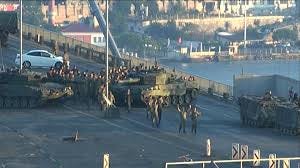
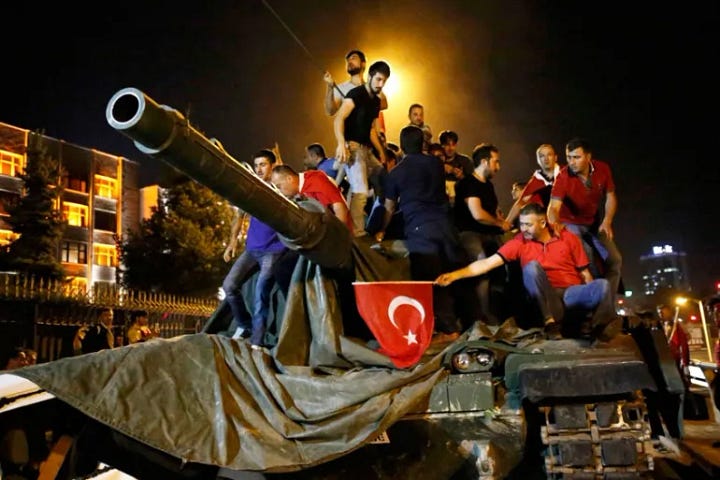
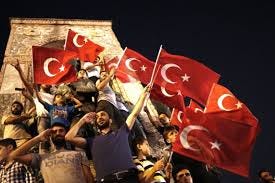

During the coup attempt, over 300 people were killed, and more than 2,100 were injured. Many government buildings, including the Parliament and the Presidential Palace were targets of air attacks. Primary and secondary school students were forced to spend the first day of school after the failed coup d'état watching videos about the ‘triumph of democracy’ over the plotters, and listening to speeches equating the civilian counter-coup that helped end the takeover, with historic Ottoman victories dating back 1000 years. On July 20, 2016, five days after the coup attempt, Erdogan declared a state of emergency. It was approved by the Turkish parliament, and scheduled to last three months, but was later extended for an additional another three months. In the wake of the coup attempt, the Erdogan administration began rounding up tens of thousands of individuals, both from within the government, and from the public sector, and incarcerating them on charges of alleged terrorism, including at least 10,000 soldiers and 2,745 judges, for being affiliated with the coup attempt. 15,000 education staff were also suspended and the licenses of 21,000 teachers working at private institutions were revoked after the government stated they were loyal to Gulen. More than 77,000 people were arrested and over 160,000 fired from their jobs, on reports of connections to Gulen. As a result of these arrests, many in the international community complained about the lack of a proper judicial process in the incarceration of Erdogan's opposition.
In August 2016, Erdogan began rounding up journalists who had been publishing, or who were about to publish articles questioning corruption within the Erdoğan administration, and incarcerated them. The number of journalists jailed by Turkey at that time was higher than any other country, including all of the journalists jailed in North Korea, Cuba, Russia, and China combined. President Erdogan and his government also pressed for court action against the remaining free press in Turkey. One of the targeted newspapers was Zaman, which was seized in March 2016. In response, former US ambassadors to Turkey, Morton Abramowitz and Eric Edelman, condemned Erdogan's actions in an opinion piece published by the Washington Post: "Clearly, democracy cannot flourish under Erdogan now. The overall pace of reforms in Turkey has not only slowed down but in some key areas, such as freedom of expression and the independence of the judiciary, there has been a regression, which is particularly worrying."
In March 2017, Germany's intelligence chief said they were unconvinced by Erdogan's statement that Fethullah Gulen was behind the failed coup attempt. The same month, the British Parliament's Foreign Affairs Select Committee, made a statement that said while some Gulenists were involved in the coup d'état attempt they had not found any hard evidence that Gulen masterminded the failed coup and found no evidence to justify the United Kingdom designating the Gulen movement as a terrorist organization. Erdogan only had himself to blame for the coup. Following an increasingly Islamist agenda, Erdogan had dropped any pretense of governing for all Turks. After fanning the flames during the 2013 Gezi Park protests, he transformed the predominantly Kurdish-inhabited areas of southeastern Turkey into a war zone reminiscent of the worst days of the 1980s. The biggest problem was Erdogan’s foreign policy, which managed to turn the initial "no problems with neighbors" doctrine into a situation where the country has problems with almost every neighbor and has even alienated some of its allies and friends.
In April 2017 Erdogan successfully sponsored legislation effectively making it illegal for the Turkish legislative branch to investigate his executive branch of government. Without the checks and balances of freedom of speech, and the freedom of the Turkish legislature to hold him accountable for his actions, many have likened Turkey's current form of government to a dictatorship with only nominal forms of democracy in practice.
2018 Election
On April 20, 2018, in the run up to the 2018 elections, Heather Nauert, the US State Department Spokesperson and the acting Under Secretary of State for Public Diplomacy and Public Affairs issued a statement on April 20, citing 'concern' for whether free and fair elections would be possible under a state of emergency (which was still in force after the 2016 coup attempt). The Ministry of Foreign Affairs declared Nauert's statements about a forthcoming election 'unacceptable'. On April 24, the Parliamentary Assembly of the Council of Europe (PACE) issued a statement calling for the elections to be delayed, declaring that they would not meet European standards or be held in a democratic manner. The United Nations High Commissioner for Human Rights, Prince Zeid bin Ra’ad, also issued a statement calling for the state of emergency to end in order to guarantee credible elections. The calls to end the state of emergency were criticised by the Turkish government and members of parliament, who called the PACE declaration 'politicised, unfair, unjust and beyond the limits’. Prime minister Binali Yildirim criticised PACE for being 'non-credible' because it had invited Democratic Union Party chairman Salih Muslim, who Turkey regards as a terrorist, to give a speech. However, on June 24, 2018, Erdogan was elected president with 53% of the vote. On July 8, 2018, Erdogan sacked 18,000 officials for alleged ties to Fethullah Gulen. Of those removed, 9000 were police officers, 5000 from the armed forces and hundreds were academics. On July 27, 2018, the state of emergency was lifted, eight days after Erdogan was sworn in as the first Executive President.
2023 Election
In May 2023, presidential and parliamentary elections were held in Turkey. The election had originally been scheduled to take place on June 18, but the government moved them forward by a month to avoid coinciding with the university exams, the Haji pilgrimages and the start of the summer holidays. Four candidates stood for election. Recep Tayyip Erdogan from the AKP, who was supported by the People’s Alliance, [consisting of the AKP, the Nationalist Movement Party (MHP), the Great Unity Party (BBP), and the New Welfare Party (YRP)], Kemal Kilicdaroglu of the Republican People’s Party (CHP) who was supported by the National Alliance [consisting of the CHP, the Good Party (IYI), the Democracy and Progress Party (DEVA), the Future Party (GP), The Felicity Party (SP) and the Democrat Party (DP)], Sinan Ogan
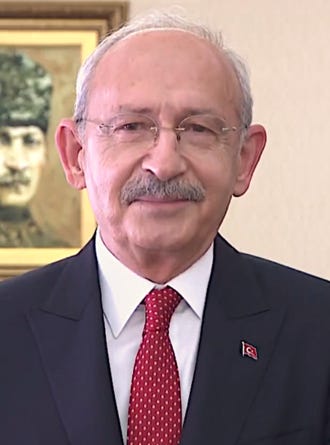
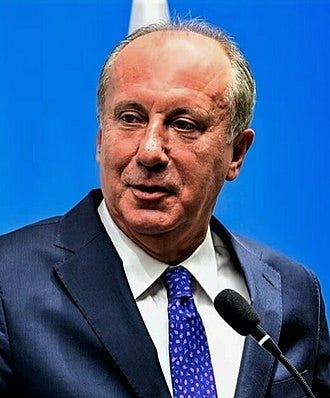
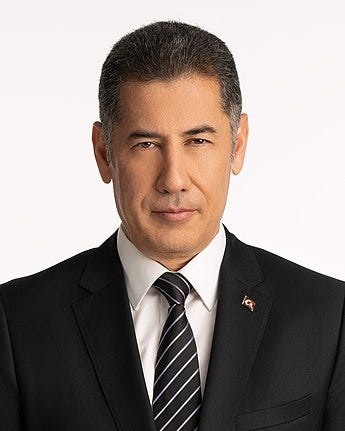
of the Victory Party (ZP) who was supported by the Ancestral Alliance [consisting of ZP, the Justice Party (AP) the My Country Party (UP) and the Turkey Alliance Party (TUIP)], and Muharrem Ince of the Homeland Party. In the the run up to the elections there were considerable concerns over Erdogan’s candidacy as well as significant political violence and foreign interference.
The concern with Erdogan running again, revolved around the fact that he had already served three terms and a fourth term violated Article 116 of Turkey's constitution. However, the courts ruled that since the presidential system was introduced in 2018 and a new office was formed, the 2018 election was Erdogan's first term in the new system and that he has the right to run again.
The violence was completely aimed at parties other than the AKP. On May 7, 2023, Istanbul Mayor Ekrem Imamoglu, a member of CHP, was attacked during a rally in Erzurum, when people in the crowd threw stones at the mayor. His supporters contended that thugs from the AKP or their allied parties were responsible for the attack, and criticized the mayor of Erzurum for not providing enough security for the event. However, Erzurum's mayor Mehmet Sekmen said that there was no written application made from Imamoglu or the Republican People's Party's provincial chairman to hold a rally in Erzurum, and it was Imamoglu who "was the one who created the chaos by rallying in Erzurum". Interior Minister Suleyman Soylu said that the incident was planned by Imamoglu to aggravate the crowds.
On May 12, extensive security measures were taken before and during a rally for CHP leader Kemal Kilicdaroglu, in Samsun following following rumours of an assassination attempt against Kilicdaroglu. Those who attended the rally were searched twice, snipers were placed on the roofs of buildings located around the location and when Imamoglu and Kilicdaroglu took the stage to speak, they were both wearing bulletproof vests and were surrounded by visibly armed security. A few weeks later while visiting the burials of citizens who lost their lives during the earthquake in Adiyaman Province, Kilicdaroglu was screamed at by a crowd as he was trying to pray. The same day another person tried to physically attack him. Two days later Kilicdaroglu’s vehicle was pelted by stones in Sakarya.
During the campaigning period for that election, just a few days before the initial round of voting, Kilicdaroglu and the CHP, accused Russian operatives of being involved in many “plots, montages and deep fakes”, in an attempt to sway the voting to Erdogan’s side. The Russian government rejected the claims.
In the first round of voting Erdogan received 49.5%, Kilicdaroglu received 44.9% and Ogan got 5.2%. Since Erdogan was unable to get 50% of the vote, a runoff election between him and Kilicdaroglu was scheduled for May 28. Before that round of voting Ogan dropped out and endorsed Erdogan. After Sinan Ogan’s endorsement of Erdogan, a Turkish journalist wrote that Ilham Aliyev, the president of Azerbaijan, arranged the meeting between Erdogan and Ogan. Istanbul City councilman and Deputy Chairman of the Good Party, Ibrahim Ozkan said that Ogan “will do whatever Aliyev says”. Azerbaijani journalist Afgan Mukhtarli said that Ogan has close relations with the Azerbaijani government and that Aliyev definitely influenced Ogan’s decision. He also wrote that "pro-Aliyev media and trolls" campaigned against Kilicdaroglu and that on May 23, 2023, the Deputy Chairman of the National Assembly of Azerbaijan, Adil Aliyev, made a speech on behalf of the People's Alliance in Meleki, Ogan's hometown.
In the second round, the turnout rate of voters abroad increased from 53.8% to 54.35%, and despite trailing in a dozen opinion polls prior to the first round of the election, the Supreme Election Council declared Erdogan the winner after 99.4% of the votes were counted, as the remaining votes to be counted were not enough for Kilicdaroglu to overcome the gap between the two. Overall, in the second round of voting Erdogan received 52.18% of the vote.
I’m sorry this post is so confusing with all the Turkish names but I am trying to illustrate how President Erdogan has moved consistently towards authoritarian rule, the longer he has been in office. Next time I will really get into the details of his moving in the direction of Islamism and how most of his decisions go against both the interests of NATO and the US. Please feel free to share this with anyone who might be interested.
Chris






